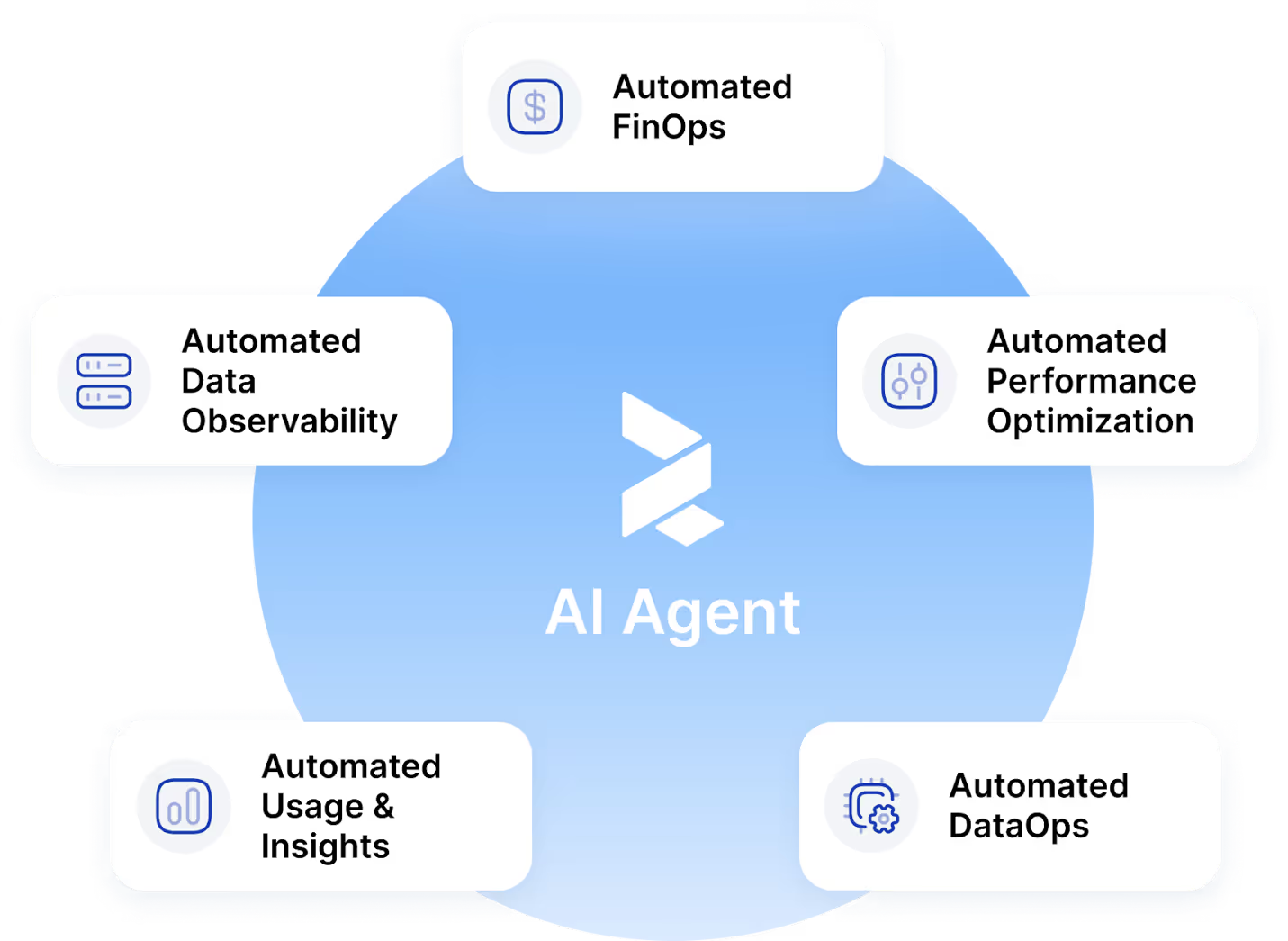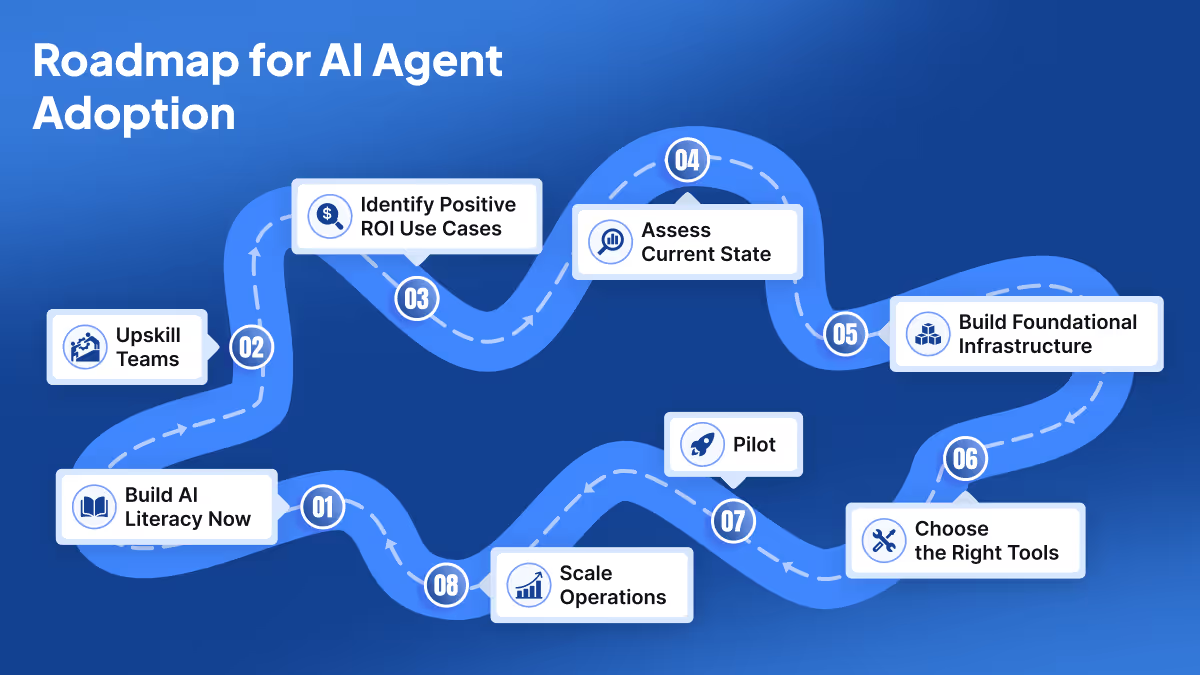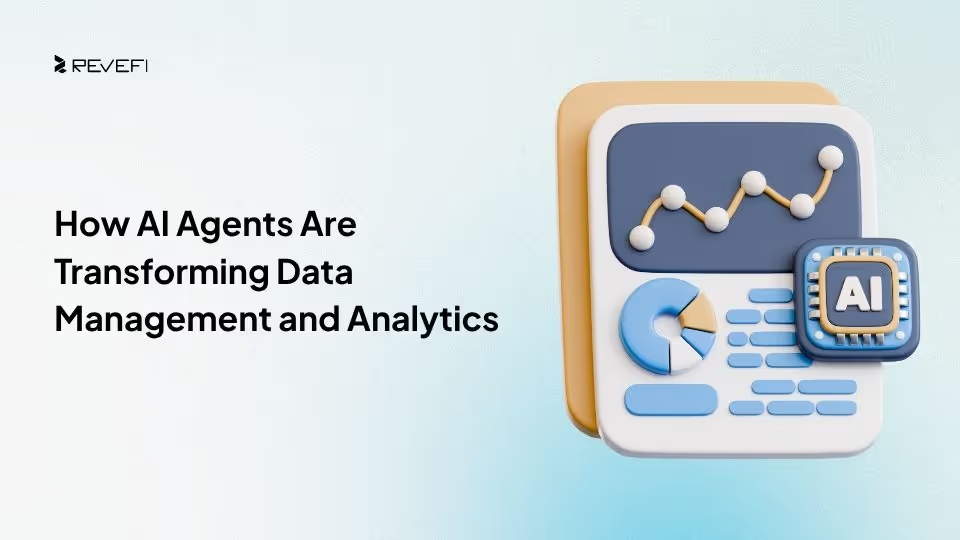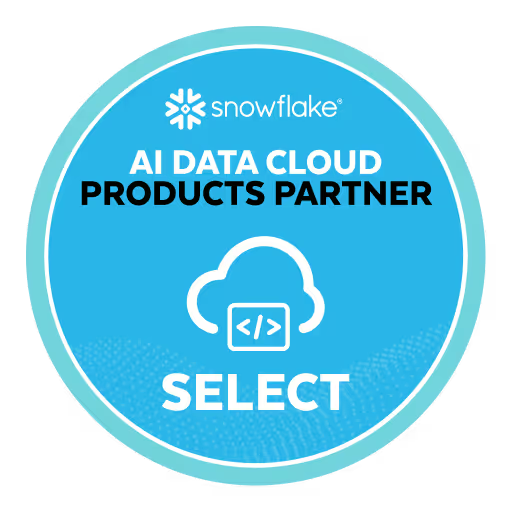Introduction
In a previous blog earlier this year, I discussed how “How AI Agents Will Transform Data Management & Analytics” through the lens of emerging roles like AI Data Engineer, AI DataOps Engineer, AI Performance Engineer, and AI FinOps Engineer, with a focus on the principles of efficiency and cost-effectiveness.
Even though I did not speculate on a timeline, fast forward to October 2025, I am seeing an expanded view of this transformation that is happening now. Adoption is gaining momentum and the previously identified roles have gained in scope and are increasing in both depth and wider coverage.
AI Agents: The new way forward
As previously discussed, AI agents are intelligent systems designed to autonomously perform tasks by leveraging AI techniques such as machine learning, natural language processing (NLP), generative AI and reasoning algorithms. These agents can perceive the environment, process information, and act to achieve predefined goals without constant human intervention. It gets interesting when reality sinks. Note (perhaps a disclaimer!): There is absolutely no consistency in its definition or types.

Typically AI Agents are distinguished by few key characteristics:
- Autonomy: Can the agent operate independently, reducing the need for constant human intervention?
- Adaptability: Can the agent modify its behavior in response to changes in its environment?
- Goal-Directedness: Are the agent's actions directed towards achieving specific objectives?
- Reasoning: Can the agent process information and make inferences to inform its actions?
We are now seeing adoption of AI Agents in data management and analytics in these categories.
- Function specific: Data Quality, Performance Optimization
- Platform specific: Snowflake Cortex, Databricks Assistant
- Domain specific: HIPAA, Fraud
- Platform agnostic: Revefi RADEN, ChatGPT Agent
- Use case specific: Data Warehouse Optimization, Live Monitoring
AI Agents are transforming Data Management & Analytics Categories
A typical data ecosystem has the following capabilities in some form.
- Data Acquisition and Integration: Collecting and combining data from diverse sources is crucial. AI agents, particularly collaborative agents, can automate tasks like schema matching and data transformation, reducing manual effort and potential errors.
- Data Storage and Management: Optimizing data storage and retrieval is essential for cost-effectiveness. AI agents, especially utility-based agents, can help with data tiering and lifecycle management.
- Data Quality, Observability and Governance: Maintaining data quality is paramount. AI agents, including learning agents, can automate data quality checks and anomaly detection, ensuring data trustworthiness.
- Data Transformation and Processing: Transforming data for analysis can be resource intensive. AI agents, such as hierarchical agents, can optimize transformation processes.
- Data Analysis and Interpretation: Deriving insights from data is the ultimate goal. AI agents, including goal-based agents, can augment human analysts by automating tasks like feature selection and model optimization.
- Data Visualization and Reporting: Presenting data insights is essential for effective communication. AI agents can assist in generating visualizations and reports.
- Data Security and Privacy: Protecting sensitive data has become hypercritical. AI agents can play a role in automating security and compliance tasks.
- Data Spend Optimization: Managing the process of analyzing and controlling data infrastructure costs to maximize efficiency, performance, and ROI across cloud and analytics environments.
The challenges experienced by data practitioners continue to persist with the ongoing surge in cloud costs, rapid demand for DataOps, and the growth in data needed for AI use cases.
- Cost Optimization: Managing the escalating cost of data storage, data processing, and computing.
- Data Complexity and Heterogeneity: Integrating diverse data sources and formats.
- Data Silos and Fragmentation: Overcoming data silos to achieve a unified view.
- Real-Time Data Processing: Processing and analyzing streaming data for timely insights.
- Scalability and Performance: Ensuring data systems can handle growing data volumes.
- Lack of Qualified Resources: Teams continue to be understaffed, and upskilling teams to leverage modern innovations is becoming increasingly impossible.
- Delivering ROI for AI use cases
It is now clear that AI Agents or equivalent will play a critical role in addressing and solving many of these challenges over time. We are now seeing a significant interest in adopting AI Agents for many or all categories of Data Management and Analytics.
AI Agents: Transforming Data Management & Analytics
With the understanding that AI agents are helping transform data management and analytics by addressing many of the challenges, it is important to embrace the fact that there is a paradigm shift underway.

This transformation drives the need for specialized skills and roles within data teams whose roles will involve significant changes over time.
- From Reactive to Proactive: AI agents, especially predictive learning agents, will enable systems to anticipate and address issues before they arise.
- From Manual to Automated: Repetitive and time-consuming tasks will be automated by reflex agents and hierarchical agents.
- From Siloed to Integrated: Collaborative agents can facilitate seamless data integration and interoperability.
- From Human-Driven to Agent-Augmented: AI agents will augment human capabilities, allowing data professionals to focus on higher-level strategic initiatives.
For greenfield initiatives with no installed legacy data systems, there is absolutely no reason to go backward and get stuck in the past! For legacy projects, AI Agents can assist in targeted ways as well.
A few key transformations that AI Agents can lead now include:
- Automation: AI agents will automate data integration, quality management, and other routine tasks, freeing up human experts. This is a core focus for AI Data Engineers, who will design and deploy a variety of agent types.
- Cost Optimization: By optimizing resource utilization and automating tasks, AI agents will drive significant cost savings. This is a key concern for AI FinOps Engineers, who will leverage utility-based agents to make cost-effective decisions.
- Enhanced Efficiency: AI agents will streamline data workflows, improving processing speed and reducing latency. AI DataOps Engineers will leverage this capability, often using hierarchical agents for complex workflow management.
- Improved Accuracy: Automated data quality checks and anomaly detection will enhance data accuracy and reliability. AI Data Engineers are crucial in implementing these systems, often using learning agents.
- Deeper Insights: AI-powered analysis and visualization will enable organizations to extract more meaningful insights from their data. AI Performance Engineers will ensure these systems operate optimally.
- Building Data Products: Analyze, pilot and prototype before undertaking expensive investments.
The Rise of the AI Augmented Data Team
The increasing adoption of AI agents in data management and analytics is leading to the further specialization of new roles and specializations within data teams. These roles are focused on leveraging AI to accelerate the building of data products, build efficient pipelines, optimize data operations, improve efficiency, and drive cost savings.

A shortlist of key agentic roles for Data Management now include:
AI Agent for Database Administrator (AI DBA): The AI DBA is an AI augmented Database Administrator (AI DBA) focused on Cloud Database Management. This is the persona that will arguably have the quickest and maximal adoption.
AI Agent for DataOps (AI DataOps): The AI Agent for DataOps is an AI augmented DataOps Engineer who assists and manages complex data pipelines, dynamically adjusting parameters and scaling resources based on design and real-time metrics.
AI Agent for Performance Optimization (AI PerfOps): The AI Agent for Performance Optimization is an AI augmented Performance Engineer who focuses on optimizing queries, execution plans, and rewriting queries to minimize resource consumption to eliminate systems downtime. This agent will handle one of the more complex tasks in data management and brings distinguished engineer level expertise
AI Agent for Data Engineering (AI DE): The AI Agent for Data Engineering is an AI augmented Data Engineer who typically focuses on Data Quality and Data Observability, Pipeline management to detect data anomalies, identifies quick fixes, and predicts potential data quality issues, enabling proactive intervention and reducing the need for costly remediation.
AI Agent for Data Spend Optimization: The AI Agent for Data Spend Optimization is an AI augmented FinOps Engineer focused on monitoring cloud data spending, identifying cost-saving opportunities, and providing recommendations for optimizing cloud resource utilization, ensuring maximum ROI on data investments.
AI Agent for Data Governance: The AI Agent for Data Governance is an AI augmented Data Governance Engineer who manages complex data governance, active and augmented metadata.
The Revefi AI Agent
The Revefi AI Agent is a Unified agent that has been helping organizations maximize the return on investment (ROI) from their data estate. By connecting to Enterprise data platforms, such as Snowflake, Databricks, Redshift and BigQuery, Revefi provides comprehensive actionable visibility, insights and control over the entire data estate. It addresses the critical challenges of escalating cloud data costs, inefficient performance, and unreliable data quality by unifying DataOps, FinOps, Observability, Governance and Performance Optimization into a single, automated solution.

The Revefi AI agent, RADEN, works autonomously to monitor, analyze, and optimize data operations. Key capabilities include proactively identifying and eliminating cost inefficiencies, predicting future spending with high accuracy, identifying performance issues and ensuring that data pipelines are both reliable and performant. Revefi's "zero-touch" setup allows for integration in under 5 minutes without requiring any code changes or agent installation, delivering rapid time to value.
Revefi has been empowering data teams at companies such as AMD, Verisk, Stanley Black & Decker to move from reactive firefighting to proactive optimization. It gives actionable insights and automated guardrails that prevent budget overruns, reduce data downtime, and improve the productivity of data engineers. By ensuring that data is both cost-effective and trustworthy, Revefi enables organizations to confidently scale their data initiatives and make better, faster business decisions.
Roadmap: Adopting AI Agents in Data Management & Analytics
Successfully adopting AI agents requires a structured, multiple-step approach that aligns technology, people, and processes. This roadmap guides enterprise data leaders from initial planning to achieving a fully autonomous, self-driving data ecosystem that delivers the right data, at the right time, at the right spend with positive ROI.

Step 1: Build AI Literacy
The foundational step is to establish a shared understanding of the paradigm shift from manual, reactive data management to a proactive, human-AI collaborative model. This involves educating all stakeholders on the unique capabilities of Agenti AI and defining a common lexicon around the key pillars of modern data operations: Data Spend Optimization, DataOps, Performance Optimization, and Data Quality and Observability. This ensures the organization evaluates the technology on its ability to deliver strategic outcomes, not just tactical features.
Step 2: Upskill Teams
AI agents augment, rather than replace, data professionals by automating tedious, manual tasks. This will elevate the role of every data practitioner from a hands-on operator to a strategic "co-pilot" who oversees a fleet of agents. To enable this shift, organizations must invest in upskilling programs focused on a hybrid competency framework that includes AI/ML fundamentals, DataOps principles, FinOps and cloud financial management, and data observability strategy.
Step 3: Identify Positive ROI Use Cases
To secure executive buy-in, all projects must be anchored in use cases that deliver clear, measurable business value. The most impactful opportunities lie at the intersection of cost control, operational speed, and data trust. A structured prioritization framework should be used to identify high-impact initial projects, such as automated data warehouse management for Data Spend Optimization, self-healing pipelines for DataOps, intelligent query tuning for Performance Optimization, or automated anomaly detection for Data Quality.
Step 4: Assess Current State
A rigorous assessment of the organization's data and AI maturity provides the essential baseline for the transformation journey. This evaluation must be multi-dimensional, covering technology and infrastructure, processes and governance, people and skills, and culture and leadership. The results of this assessment will identify critical gaps and inform a targeted action plan, helping to tailor the AI agent's initial role as a "Maturity Accelerator" that can rapidly advance the organization's capabilities.
Step 5: Build Foundational Infrastructure
Preparing the technical environment is crucial for a seamless, "zero-touch" deployment that delivers value in minutes. This involves ensuring the AI agent has secure, read-only access to necessary platform metadata (e.g., query logs, system tables), configuring a dedicated, least-privilege IAM role for the agent, and verifying network configurations allow for secure communication. This process also serves to strengthen the organization's overall security and governance hygiene.
Step 6: Choose the Right Tools
Selecting the right AI agent is a critical strategic decision. The evaluation should prioritize vendors that offer a single, truly unified platform over a collection of siloed point solutions. Key evaluation criteria include the level of true autonomy (self-driving vs. AI-assisted), rapid time-to-value (minutes vs. months), comprehensive support for the entire data stack, and a robust, certified security posture. A structured scorecard helps ensure an objective, data-driven selection process.
Step 7: Pilot
Design pilot projects ed to be small-scale, transformative wins that validates the technology and a new, AI-driven way of working. The project should be narrow in scope by focusing on a high-impact use case such as Data Spend Optimization for a single data warehouse with clearly defined business and technical success metrics. A successful pilot provides the quantitative ROI and qualitative team testimonials needed to build a compelling business case for an enterprise-wide rollout.
Step 8: Scale Operations}
Scaling moves from proving value to distributing it across the enterprise. This is best achieved through a phased rollout, starting with replicating the successful pilot use case in other business units (horizontal expansion) before deepening the agent's capabilities to cover all four pillars within a domain (vertical expansion). A centralized Center of Excellence (CoE) may need to be established to set global policies, manage the practitioner-AI interface, and measure the total business impact, guiding the organization toward its ultimate goal: a self-tuning, self-driving data ecosystem.
Conclusion
Even though AI agents are relatively new, they are already helping by automating key capabilities for data management and analytics now and will eventually transform it.
The technology landscape is rapidly evolving, with commercial solutions offering agentic capabilities that support these emerging roles.
Revefi, for example, is offering a skilled agentic AI solution for various data management tasks. These skills, available as augmentation, viz., AI Agent for Database Administrator, DataOps, Performance Optimization, Data Engineering, Data Spend Optimization, Data Governance, Data Observability work with your data team and ecosystems to provide superior ROI.
These roles, supported by native-AI and AI augmented platforms and tools, will be instrumental in helping organizations thrive in the data-driven future. As AI technology advances every day, the transformative impact of AI agents will only intensify, ultimately reshaping the way we work with data and unlocking new possibilities for innovation and growth.
Key References:
- 2025 Gartner® Cool Vendors™ in Data Management: The ‘Modern Data Stack’ Grows Up Report by Gartner Research, 2025
- Manage D&A Cloud Costs With Tool-Powered Budget Controls by Gartner Research, 2025
- Emerging Tech Impact Radar: Data and Analytics by Gartner Research, 2025
- Verisk's Journey with Revefi: Optimizing Data Observability and Cost Efficiency by Gartner Research, 2025










